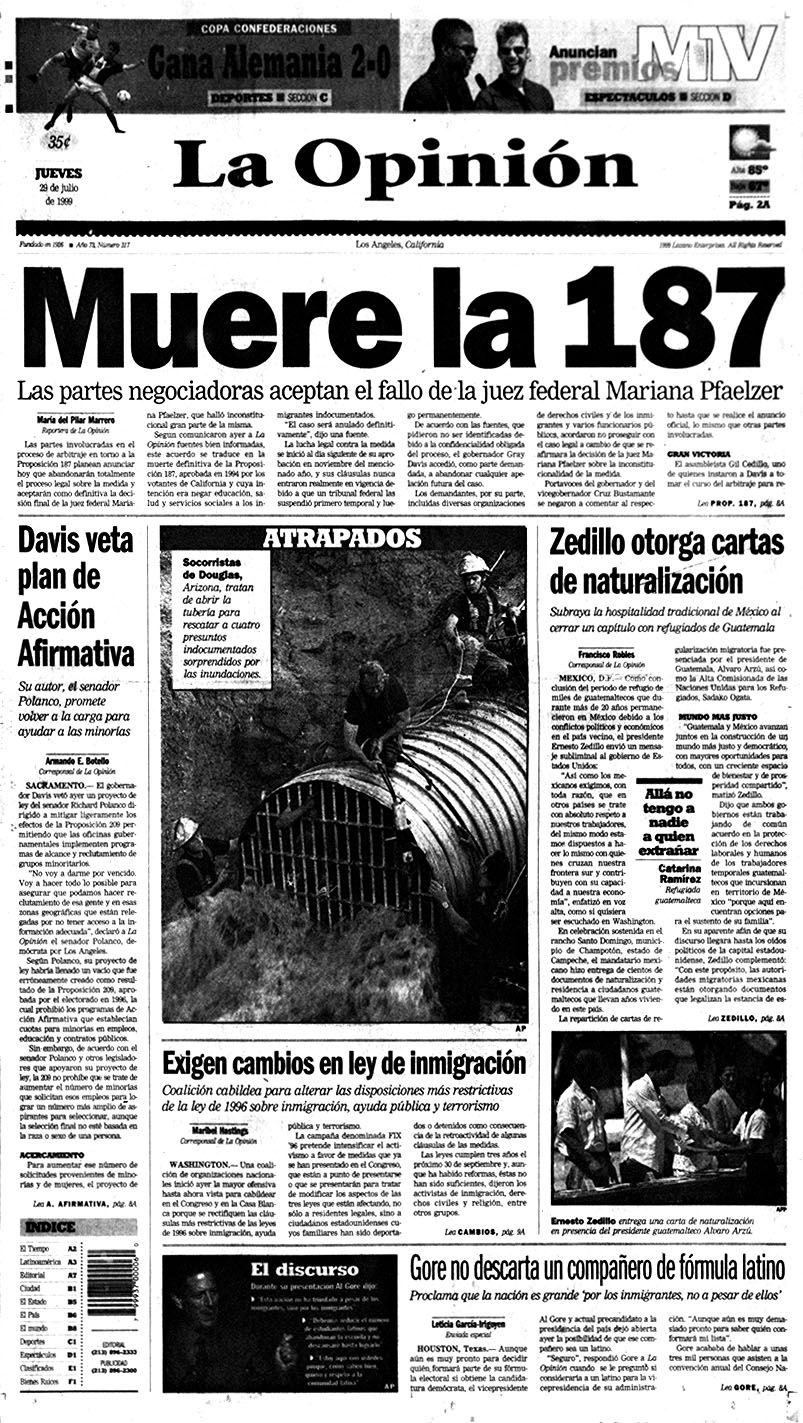A quarter of a century later, the entire nation seems to be under the influence of something worse than Proposition 187.
These were difficult days for the immigrant community in California. Possibly there was no other time in the past, since the repatriations of half a million Mexicans in the 1930s, which were used as scapegoats for the Great Depression. However, only eight years had passed since the 1986 immigration reform, a bipartisan project signed by President Ronald Reagan, and only three since his successor, George HW Bush, had legalized more than a million undocumented immigrants who had been left out of reform.
Even so, the then Republican governor of California, Pete Wilson, insisted on suspending basic aid for the undocumented community. Proposition 187 emerged, which went to the polls in November 1994. The political reality of the golden state was very different from today. Republicans had dominated Sacramento and placed the only two presidents from this region in the White House: Richard Nixon and Reagan himself. Proposition 187 was approved by 58.9% of the votes in favor and 41% against. According to official figures, 78% of Republicans and 62% of independents spoke in favor of the proposal, while 64% of Democrats opposed it.
It is estimated that at that time California had at least one million 300 undocumented immigrants in its territory, including some 300,000 children.

What to do from the main newspaper in Spanish throughout the Southwestern United States? That was the case of La Opinion, which had been the voice of the Hispanic community of Los Angeles since 1926. Its pages were filled with articles related to the controversial proposal to eliminate public education and health for unauthorized immigrants. That forced police and other security officials to denounce the undocumented before the Immigration and Naturalization Service, and forbade local governments to prevent these law enforcement officers from fulfilling that obligation. Much of the community, mainly young students, flooded the streets of the state, with loud protests against the purpose of abandoning their fate to those who had fled poverty, violence, dictatorships and bloody civil wars. In each of these events was La Opinion, with all its artillery of young reporters who, although they never lost their objectivity, felt part of the victims.
Of course, the editorial pages were also filled with opinions and the newspaper's position was firm from the start. The Opinion condemned, without a doubt, Proposition 187.

But it was also necessary to go beyond the news, of the events of the day. Since the founding of the Nombre de Dios mission in St. Augustine, Florida, in 1565, the Hispanic presence in what we have subsequently known as the United States of America has been overwhelming. Contributions to this country in numerous and important lines had been decisive in laying the foundations of the nation. Blaming immigrants for economic crises or lack of jobs was not only a falsehood. It was also slander. Then we decided to make a special series in 10 parts about the Hispanic contributions to the country in agriculture, construction, services and other lines of the economy, about the purchasing power of the Latino as a consumer, of their sacrifices in the wars that Washington had waged , his presence in the world of space exploration and science, his creativity in music, art and literature, his strength in sports and many other spaces of American society.
The management of La Opinión made available to that project all the resources that were necessary. Reporters from the local section mixed with sports and entertainment chroniclers, with photographers, designers, section editors, proofreaders and proofreaders, with translators. Happily, that special series came out day after day for almost two weeks. Many were surprised, because not only the activists and protesters who were on the streets trying to prevent the approval of the 187 were amazed at what La Opinion had done. The local universities also called the newspaper to ask if there was an English translation of those articles.
Luckily for the undocumented, for the entire immigrant community and for the image of California, Proposition 187 was provisionally detained on November 11, three days after its approval, by federal judge Matthew Byrne. In December 1994, Judge Mariana Pfaelzer blocked the implementation of the proposal, except at the points of access to higher education and the use of false documents. Three years later, in November 1997, Pfaelzer decided that Proposition 187 was unconstitutional in trying to regulate immigration, which was a federal government's task. Governor Wilson challenged the decision before the Court of Appeals for the Ninth Circuit, but in July 1999 California already had another governor, Democrat Gray Davis, who abandoned the appeal filed by Wilson. There died 187 definitely.
There are many experts who claim that 187 changed the political face of California. From that moment, the golden state ceased to be a republican to become a mostly democratic state. However, a quarter of a century later, the entire nation seems to be under the influence of something worse than 187.
The raids that are carried out on the orders of President Donald Trump, the separation of immigrant families arriving at the border, restrictions on almost all types of immigration, and harassment in the streets by people and supremacist groups to Latinos, including US citizens of that origin, have aroused new frustrations and a sense of defeat.
At the moment, there is only one way out of this crisis: massive attendance at the polls in the November 2020 elections.
(*) Jesús Hernández Cuéllar was editor of the Metropolitan section of La Opinion and is founder and director of the digital magazine Contacto Magazine.









